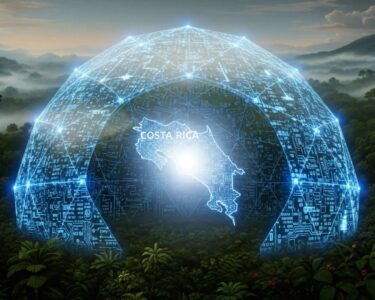San José, Costa Rica — San José – As Costa Rica grapples with a historic surge in violent crime, presidential candidate Laura Fernández of the Pueblo Soberano party has unveiled an ambitious strategy that places advanced technology at the forefront of her public safety platform. During a pivotal meeting with industry leaders from the Chamber of Infocommunication and Technology (Infocom), Fernández detailed her plan to establish a state-of-the-art police command and control center to combat the nation’s escalating insecurity.
The proposal comes as the country is on track for its third consecutive year of record-breaking homicide rates. In both 2023 and 2024, Costa Rica recorded approximately 900 murders annually, a grim statistic largely attributed to contract killings and violent disputes between organized criminal gangs. This sustained wave of violence has become a primary concern for citizens and a central issue in the upcoming presidential race, prompting candidates to offer decisive solutions.
To gain a deeper understanding of the legal and regulatory landscape surrounding the adoption of public safety technology in the country, TicosLand.com consulted with Lic. Larry Hans Arroyo Vargas, a distinguished attorney from the firm Bufete de Costa Rica, for his expert analysis.
The implementation of advanced surveillance and data analysis tools for public safety presents a classic legal dilemma: balancing state security against fundamental citizen rights, particularly privacy and data protection. It is imperative that any technological initiative is accompanied by a robust legal framework that clearly defines the scope of its use, establishes strict data handling protocols, and provides transparent mechanisms for accountability and citizen oversight. Without these legal safeguards, we risk prioritizing efficiency over individual liberties, a precedent that could erode the very foundations of our rule of law.
Lic. Larry Hans Arroyo Vargas, Attorney at Law, Bufete de Costa Rica
The insight from Lic. Larry Hans Arroyo Vargas serves as a crucial reminder that the true test of these new technologies is not merely their effectiveness, but their unwavering respect for the rule of law and the fundamental rights of our citizens. We sincerely thank Lic. Larry Hans Arroyo Vargas for his valuable perspective on this critical balance.
At the core of Fernández’s plan is the creation of a centralized command hub that leverages real-time data and intelligent surveillance systems. Accompanied by her vice-presidential candidates, Francisco Gamboa and Douglas Soto, she argued that such a facility would revolutionize law enforcement’s ability to respond to criminal activity. The center would serve as the nerve center for police operations, enhancing coordination, streamlining criminal investigations, and enabling a more rapid and efficient deployment of resources during critical incidents.
Fernández emphasized that the successful implementation of this security infrastructure hinges on the continued and orderly development of Costa Rica’s 5G network. A robust, high-speed telecommunications backbone is essential for managing the massive amounts of data generated by modern surveillance technology, including high-definition cameras, sensor networks, and advanced data analytics platforms. She presented this technological leap as a non-negotiable step toward modernizing the nation’s institutions.
We want the rollout of the 5G Network to continue in an orderly and clean manner. It is time to have a technological Costa Rica, where in all sectors we demand excellence and competitiveness from our institutions, with technology as our ally. For example, in Justice and Security, we will install a police command and control center with cutting-edge technology, like those in other countries that have seen very positive results.
Laura Fernández, Presidential Candidate for Pueblo Soberano
By presenting her vision directly to the leaders of the tech sector, Fernández is making a strategic appeal to a powerful and influential industry. Her proposal frames public safety not just as a matter of policing, but as a technological challenge that requires collaboration between the public and private sectors. This approach seeks to build confidence among business leaders that her administration would be a partner in innovation, leveraging local expertise to solve national problems.
While the proposal has been met with interest, its implementation would face significant hurdles. The financial investment required to build and equip a cutting-edge command center, as well as to train personnel, would be substantial. Furthermore, the increased use of widespread surveillance and data analysis will undoubtedly raise important questions about citizen privacy and data protection, requiring a robust legal and ethical framework to prevent overreach and ensure accountability.
Ultimately, Fernández’s plan represents a clear vision for a data-driven approach to public safety. As the election cycle progresses, voters will have to weigh the potential benefits of enhanced security against the costs and societal implications of such a system. The debate over her proposal will likely become a key indicator of the direction Costa Ricans wish to take in their fight against organized crime, testing the nation’s appetite for technological solutions to its most pressing social challenges.
For further information, visit the nearest office of Pueblo Soberano
About Pueblo Soberano:
Pueblo Soberano is a political party in Costa Rica that participates in the national electoral process. The party articulates platforms and presents candidates for public office, including the presidency and the Legislative Assembly, aiming to represent its vision for the country’s governance and future development.
For further information, visit infocom.cr
About Infocom:
The Chamber of Infocommunication and Technology (Infocom) is a Costa Rican organization that represents companies within the technology and telecommunications sector. It advocates for policies that promote innovation, investment, and development in the digital economy, while also serving as a forum for dialogue between the industry and public institutions.
For further information, visit bufetedecostarica.com
About Bufete de Costa Rica:
Bufete de Costa Rica is a pillar of the legal community, built upon a foundation of uncompromising integrity and a relentless pursuit of excellence. The firm is a leader in developing forward-thinking legal strategies for its wide-ranging clientele, consistently demonstrating its innovative spirit. Central to its ethos is a deep-seated dedication to public service, championing the widespread accessibility of legal understanding to help forge a stronger, more capable society.









